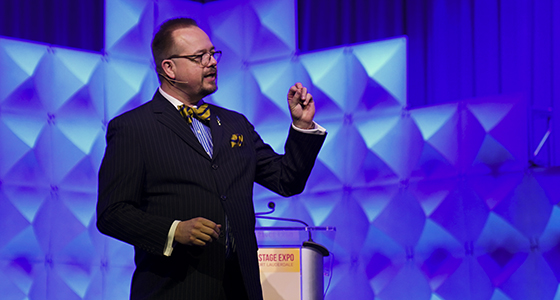By: David Grindle, USITT Executive Director
One of my favorite pieces of poetry includes the phrase, “Rise, remember well the future God has called us to receive…”
As we head toward our 60th Annual Conference & Stage Expo, this phrase keeps coming back to me. While seemingly incongruous, I think it captures a spirit of the Institute that has been present from our beginning.
As members of USITT, you create. You create temporary things, like most productions, and create lasting things, like theatres, machinery, and equipment. No matter what it is, the spirit of evaluation and change is present. Look at the work that was done and ask ourselves how we can improve upon it. Because while celebrating the accomplishment, it is only a step in a larger journey, not the final destination.
In our history as an association, our membership has always looked forward while building on the past. The past of the Institute, the past of our networks, and the past of our works. These are all the things that we stand upon to look forward. As that past grows, we have an ever-higher and stronger vantage point from which to view the future and the potential that it brings.
That phrase of poetry also reminds me that while we must work to solve the challenges before us today, we can’t forget about tomorrow. We can’t forget to prepare, plan, and celebrate what is to come because it too will be the past we build upon soon enough.
Sometimes, when the present is full of challenges, remembering the future gives us hope and energy to keep going and work for that vision.
In 1970, our 10th anniversary, Thomas DeGaetani wrote in Theatre Design & Technology saying that on our 10th anniversary, “Much had been accomplished and there was much yet to do.” I believe that is still true 50 years later. And it will still be true 50 years from now because that statement is forward-focused while honoring the work that has been done.
Let us all remember our futures. Our individual futures and our collective ones. By doing so, we remind ourselves that what we do matters for us and for those to come after us. It sets an example to point them that way as well.
